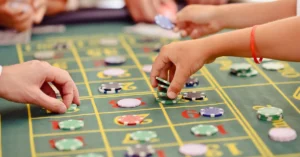
Learn how RNG powers online table games, ensuring fairness, unpredictability, and excitement for every player in the world of online games.
How RNG Works in Online Table Games for Fair and Exciting Play
The rise of online games has changed the way players experience table games like blackjack, poker, roulette, and baccarat. One of the key technologies that makes online table games possible — and trustworthy — is the Random Number Generator (RNG).
For many players, RNG might seem like an invisible element working in the background, but it’s the foundation that ensures each round is fair, random, and unpredictable. Without RNG, online table games wouldn’t be able to replicate the authentic experience and integrity found in traditional casinos.
In this AW8 Pro article, we’ll explore how RNG works in online table games, why it’s crucial for fairness, and how it shapes the future of digital gaming.
What is RNG in Online Table Games?
RNG, short for Random Number Generator, is a complex algorithm used in online games to generate unpredictable results. In physical casinos, the randomness comes from shuffling cards, spinning a roulette wheel, or rolling dice. Online, RNG takes on that role digitally.
Instead of a dealer physically dealing cards or spinning a wheel, the RNG generates a completely random outcome for each game round — simulating the same unpredictability you’d find in a real casino.
Types of RNG Used in Online Games
There are two main types of RNG used in gaming technology:
-
True Random Number Generator (TRNG)
-
Relies on physical phenomena (like atmospheric noise or radioactive decay) to produce random results.
-
Rare in online gaming due to cost and hardware requirements.
-
-
Pseudo-Random Number Generator (PRNG)
-
Uses mathematical formulas to generate sequences that appear random.
-
Most commonly used in online table games because it’s fast, reliable, and easy to integrate with game software.
-
While PRNG isn’t truly random in the purest sense, its algorithms are so advanced that outcomes are impossible to predict without knowing the internal seed value — making it effectively random for players.
How RNG Works Step-by-Step
-
Seed Value Generation
The process begins with a seed value — a starting number that the PRNG algorithm uses to create a sequence. -
Mathematical Processing
The algorithm processes the seed with a complex formula to produce a new number. -
Outcome Mapping
The generated number is mapped to a game result — for example, a specific card in blackjack or a slot on the roulette wheel. -
Continuous Cycling
RNGs run continuously, even when no one is playing, ensuring that results are always in motion and cannot be timed or predicted.
Why RNG is Vital in Online Table Games
RNG ensures that every hand, spin, or roll in an online table game is fair and unbiased. Here’s why it’s so important:
-
Fairness: Ensures all players have an equal chance of winning.
-
Unpredictability: Prevents patterns or predictable sequences.
-
Game Integrity: Maintains player trust in online games.
-
Regulatory Compliance: Licensed operators are required to use certified RNG systems tested by independent auditors.
Examples of RNG in Popular Table Games
-
Blackjack: Determines the sequence of cards drawn.
-
Roulette: Randomly selects the winning number and color.
-
Baccarat: Decides the order of cards for Player and Banker.
-
Poker: Shuffles the virtual deck for every hand.
Common Myths About RNG
-
“RNG can be rigged easily.”
-
In regulated platforms, RNG systems are tested and certified regularly.
-
-
“Patterns appear if you play long enough.”
-
RNG outcomes are independent of previous results — there’s no memory or streak bias.
-
-
“You can time the RNG to win.”
-
RNGs operate continuously, making it impossible to predict the exact moment to play for a desired result.
-
How RNG is Tested and Certified
Reputable gaming platforms use third-party auditors to test their RNG systems. These auditors run millions of simulated games to ensure the results meet statistical randomness standards. Some common tests include:
-
Chi-square tests
-
Diehard tests
-
Kolmogorov-Smirnov tests
Only after passing these tests can an RNG be certified for use in online table games.
RNG vs Live Dealer Games
While RNG is essential for virtual table games, live dealer games combine human interaction with camera streaming technology. Here, outcomes come from real-world physical actions (shuffling cards, spinning wheels) instead of RNG.
However, even live dealer games may use RNG in background processes — such as shuffling virtual shoe decks or handling bonus features.
The Future of RNG in Online Gaming
As technology evolves, RNG systems are becoming more sophisticated, transparent, and secure. Blockchain-based RNGs are emerging, offering players provable fairness by recording outcomes on a public ledger.
Artificial intelligence is also playing a role in detecting suspicious patterns, ensuring the RNG remains fair for all players.
Final Thoughts
RNG is the beating heart of online table games. It ensures that every hand, roll, and spin is fair, unbiased, and unpredictable — replicating the excitement of a physical casino in the digital world. Without RNG, the trust and integrity of online games would collapse.
Whether you’re a casual player or a seasoned strategist, understanding how RNG works helps you appreciate the technology that keeps your favorite games fair and fun.
The world of online and live table games continues to grow, offering excitement to players everywhere. Let’s come together to support our favorite league and keep the passion for fair, thrilling gaming alive.




